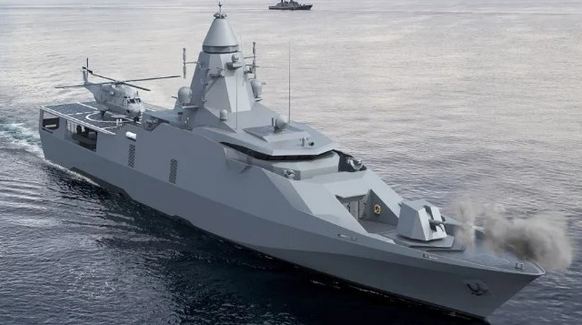Sequel to the supply order from the Nigerian Navy, the Turkish Shipyard Company, Dearsan, on the 3rd of October 2021, contracted with them to build two offshore patrol vessels (OPVs) for maritime operations.
Nigerian navy, which is an armed force that emerged from the Marine Department of the Royal Navy in 1887, is one of the largest navies in the region of Africa, also rooted with the Nigerian maritime of 1914.
It started as a quasi-military organization and expanded to a federal armed force comprising thousands of personnel, such as the Coast Guard.
Their primary duties are to provide naval defence for the nation according to the Navy Act of 1964, offer basic sea training, consolidate operations, and ensure the maintenance of the country’s law inside the waters and territorial Exclusive Economic Zone (EEZ).
And to enable the Nigerian naval officers to carry out their maritime duties appropriately, they need several water resources like offshore patrol vessels (OPVs).
Why Nigerian Navy Order Two Patrol Vessels from Turkey’s Dearman
Nigerian navy orders two patrol vessels from a shipyard operating in İstanbul, Turkey, called Dearsan for several cogent reasons.
And one good thing is that they make sure to sign a deal with a renowned, contemporary shipyard capable of constructing many ships of various types simultaneously. The company is one of the best shipbuilders in Turkey that began operation in 1980.
Nigeria navy ordered two units of 76 m offshore patrol vessels (OPVs) for the following reasons:
1. Effective maritime interdiction operations
The offshore patrol vessels have high endurance, making them extremely good for effectively executing maritime or naval interdiction operations (MIOs).
With the help of the new maritime technology, Nigeria naval officers will be able to disrupt the military capability surface of the enemies, destroy terrorist organizations, and fight armed gangs.
2. Efficient surveillance
Again, the OPVs designed for border protection, rescue duties, and coastal defence will also enable the Nigerian Navy to carry out efficient maritime surveillance operations.
The surveillance system helps ensure the safe execution of all the maritime activities in the oceans and seas.
3. For special forces operations
The OPVs which the Turkish shipyard will supply to the Nigerian navy will also help for effective Special Forces operations in the maritime.
Although the offshore patrol vessels may be the smallest ship in a navy’s fleet, they are seaworthy enough to patrol off-shore special operations.
4. Patrol activities in the Gulf of Guinea
The Nigerian navy signs the deal for the OPVs supply for patrolling in the Gulf of Guinea as part of Nigeria’s heightened attempts to restrain the menace of piracy.
The high-tech and state-of-the-art systems are one of the features of the OPVs that will make them capable of assisting naval officers for anti-drug trafficking operations, rescue operations, disaster relief operations, anti-smuggling, and anti-piracy, among others.
Nigeria Signs a Deal to Procure Two Patrol Vessels from Turkish Shipyard
A few days after Nigeria and Turkey committed to intensifying bilateral relations, Nigeria Navy and Dearman, a maritime shipyard construction company in Istanbul, Turkey, signed a deal for offshore patrol vessel ships (OPVs) supply to strengthen maritime security and military defence.
According to the deal terms, the Nigerian Navy (NN) signed with Dearsan on the 3rd of November, the construction of two new offshore patrol vessel ships will be set for delivery in three years, precisely, by December 2024.
According to the signed agreement for better naval operations, the maritime ship vessels will also feature local sensors and systems.
Dearsan shipyard explains that the OPVs have their configurations in line with the Nigerian Navy requirements will be designed and built entirely within their shipyard’s capacity and then equipped with ultramodern technologies.
Admiral Awwal Gambo, the chief of the Nigerian Navy, during the event, says the contract between the two countries has marked another achievement by Nigerian Navy in their continuous effort to meet up to the 2021 to 2030 plan.
Awwal Gambo makes the audience understand that the Nigerian Navy bore dominant status in the region by assisting aggressive presence in the nation’s marine environment in the last few months.
He continues by saying that the dominant statutes of the Nigeria Army cause a reduction in acts of crime in the country. Furthermore, he emphasizes how valuable the 250-foot vessels will help in embarking on maritime interdiction operations.
The interdiction action includes the observation, Special Forces action, and provision of the naval security support to the land force.
Additionally, the OPVs help the Nigerian army conduct proper search and rescue operations, disaster relief operations, disaster relief operations, and related others mentioned earlier.
Mr. Murat Gordi, the chief executive officer of Dearsan, notes that the contract, which will add an extra value of new technology to maritime operations, is a way to build a core relationship between the two countries that had the contract.
The Dearsan shipyard has been producing naval boats for many years. They have supplied about 16 Tuzla class patrol boats to the Turkish Navy in 4 years and ten Serhet-class patrol boats to Turkmenistan.
Also, they have collaborated with Gulhan Shipyards to build the first Turkman-class corvette called the “Deniz Han,” making them reliable and renowned across the country and beyond.
The OPV 76 meter offshore patrol vessel that Dearsan Shipyard Company will supply to Nigeria by 2024 will include various features for proper several maritime operations, especially in anti-surface warfare, anti-air warfare, and naval gunfire support.
Also, the OPV 76 is built from the AH-36 steel to function in asymmetric warfare for counter-piracy actions and lots of other ocean and sea operations.
Again, this OPV 76 is 78.6 meters long and 11meters wide, while its draft is 2.9 meters too, and it has 1200 tons as a displacement.
Final Words
The 76-meter offshore patrol vessels (OPVs) have a range of 3000 nautical miles with economical speed and can also function with 46 teams, thus, will improve the speed of operations in the maritime industry of Nigeria.


